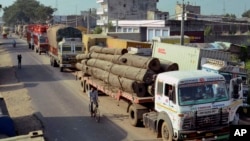Nepal is facing critical shortages of fuel and other supplies following weeks of protests by an ethnic community over the new constitution. The shortages have led to deepening anger with India in the landlocked country, which blames New Delhi for imposing an economic blockade.
Nepalis are preparing for their biggest annual festival, Dashain, but instead of indulging in the usual frenzy of shopping and celebrations, most households are coping with spiraling food prices and fuel rationing.
Shortages
The reason: at the Birgunj border crossing from India into Nepal, a snaking, nearly 30-kilometer line of oil tankers and trucks has piled up.
Protestors from the Madhesi community who live along the Nepal-India border have pitched tents at the crossing, which carries 80 percent of Nepal’s trade and goods. They are demanding that the government amend the constitution adopted last month to give them better representation in government and parliament.
The situation is bleak, says Nepali Times editor Kunda Dixit. “In Kathmandu there literally are five mile-long [8 kilometers] petrol queues at gas stations. Everywhere, the combination of the blockade and the agitation have meant that for two months now ordinary people have not been able to get about, their essential supplies are running out, schools have been closed and hospitals have been running out of medicine,” he said.
The shortages have triggered intense anger with India in Nepal, which accuses New Delhi of colluding with the Madhesis to mount the unofficial blockade. They blame Indian security forces for not stopping the protestors when they flee into Indian territory to escape their own police.
Niew Delhi sympathetic to protesters
The Madhesis have close cultural and economic ties to Indians, and New Delhi is sympathetic to their demand for greater inclusion in parliament and government.
India denies being responsible for the blockade, saying that protests on the Nepalese side have disrupted the flow of goods. It says truckers are scared to enter Nepal for fear of violence.
But that has little meaning in Nepal, where effigies of Prime Minister Narendra Modi have been burnt in recent weeks and hashtags such as #backoffIndia have trended on social media.
Sukh Deo Muni, a South Asia analyst in New Delhi, says the anger is justified because India used the Madhesi protests as an excuse to strangle the flow of goods into Nepal. “The gross mistake which was made, we were punishing ordinary Nepalese for putting pressure on the government. India must have realized that this is a new Nepal, there are young people, they would get irritated. There is already a certain core of anti-Indianism in Kathmandu and that got burst out, and rightly so. Diplomacy should have sought other means,” according to Muni.
New Delhi, which under Prime Minister Modi has been wooing its neighbors to fend off Chinese influence, is trying to reverse the damage done to ties. Modi congratulated Nepal’s new prime minister, K.P. Sharma Oli, minutes after his election Sunday and is expected to hold talks soon with a senior Nepalese official.
Relations strained
But regaining goodwill in Nepal may be an uphill task for India. “As it stands now, I think it will be almost impossible because of the way this blockade has been handled,” said Kunda Dixit.
Meanwhile, Madhesi leaders have vowed to continue protests until their demands to redraw the boundaries of Nepal’s seven new provinces are met. They say these provinces have been carved to ensure the continuing domination of the hills people in Nepal.
Prime Minister Oli has signaled that he wants a solution to the problem that has jeopardized Nepal’s unity and is expected to call the Madhesis for negotiations.
That has made a senior leader of the Tarai Madhes Loktantrik Party, Hridayesh Tripathi, hopeful, but he is also wary because of Oli’s reputation as a hardliner. “He has always shown that he does not want any change. His earlier hue is very much reactionary. But now he has become the prime minister and he wants to address, let us see what will happen,” said Tripathi.
The latest crisis has brought more anguish to millions of ordinary Nepalese just when they were hoping to put behind memories of the devastating April earthquake and immerse themselves in festive celebrations.
In New Delhi, Ram Nath, who works as a domestic, is preparing to leave on Saturday for Nepal to join his family for Dashain, but is unsure of making it in time. “It is going to be very tough. We will reach the border crossing, then we will have to call someone to help us, it is so harassing, ” he laments.
He is among the tens of thousands waiting for normalcy to be restored at the border with India, which is literally the lifeline to Nepal.




